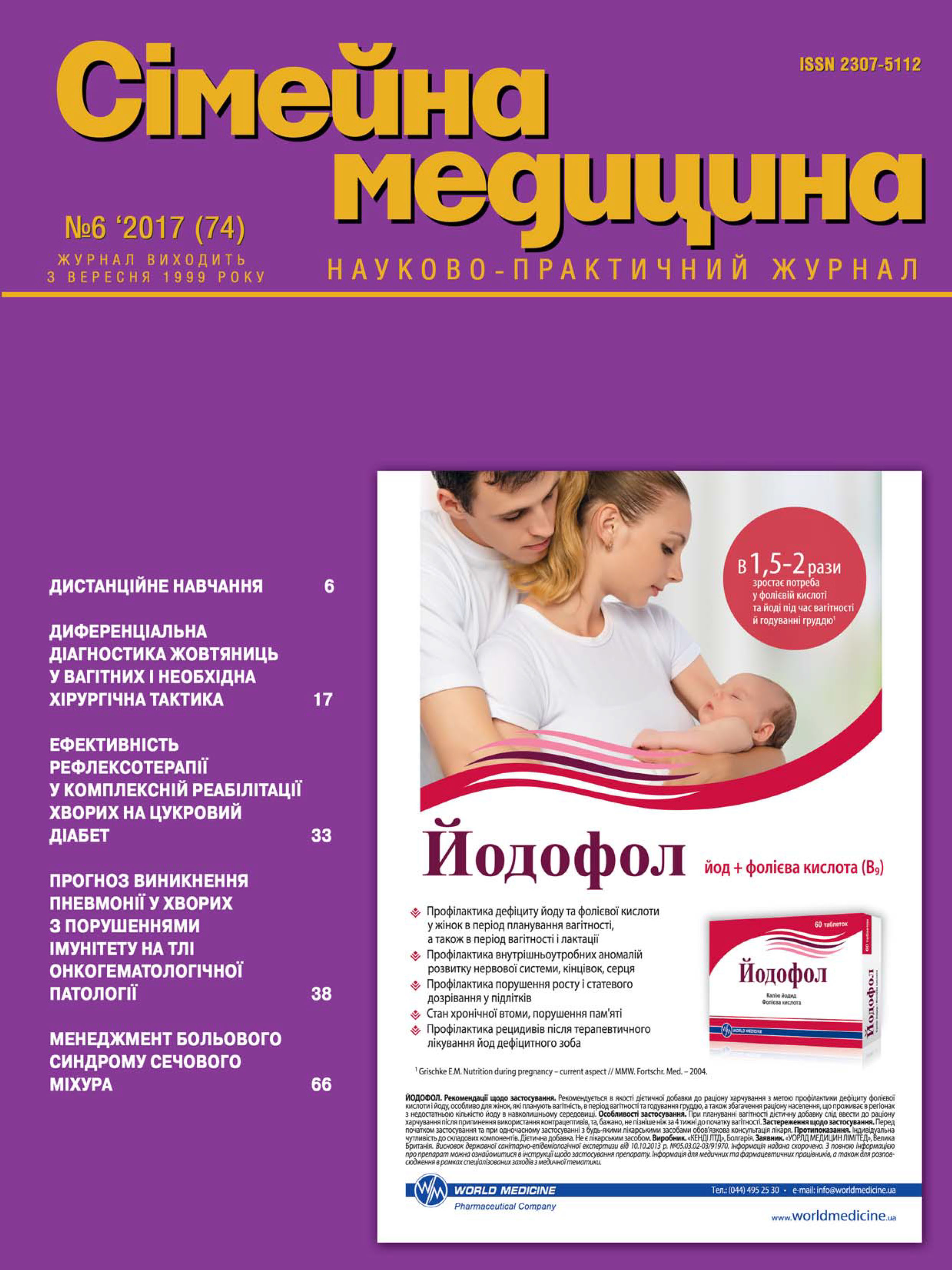Значення натрійуретичних пептидів у невідкладних кардіологічних станах
##plugins.themes.bootstrap3.article.main##
Анотація
Серцево-судинні захворювання продовжують сьогодні залишатися основною причиною смертності та інвалідності в усьому світі. За 1990–2020 рр. кардіоваскулярна смертність збільшиться з 28,9% до 36,3%. Причинами невідкладних звернень у клініки у зв’язку із серцем найчастіше є біль у грудях, шокові стани, серцева задишка, аритмії, більшість з яких виникають внаслідок ішемічної хвороби серця, гострих коронарних синдромів, а також інфаркту міокарда та серцевої недостатності. У ході досліджень, проведених у світі в останні роки, встановлена велика роль натрійуретичних пептидів у ранній діагностиці різних серцевих захворювань. Аналіз натрійуретичних пептидів у невідкладних кардіологічних станах дає більш швидкий і точний результат порівняно з іншими лабораторними дослідженнями. Найефективнішим буде вибір схеми подальшого лікування у пацієнтів, які звернулися з певними клінічними ознаками, шляхом проведення аналізів BNP і NT-proBNP. Зокрема, підвищення NT-proBNP досить інформативно з діагностичної точки зору у разі ішемії без некрозу міокарда.
##plugins.themes.bootstrap3.article.details##

Ця робота ліцензується відповідно до Creative Commons Attribution 4.0 International License.
Автори зберігають авторське право, а також надають журналу право першого опублікування оригінальних наукових статей на умовах ліцензії Creative Commons Attribution 4.0 International License, що дозволяє іншим розповсюджувати роботу з визнанням авторства твору та першої публікації в цьому журналі.
Посилання
Charles H. Hennekens, MD, DrPH. Increasing burden of cardiovascular disease. Current knowledge and future directions for research on risc factors. Circulation. 1998; 97: 1095–1102. https://doi.org/10.1161/01.CIR.97.11.1095
Cardiovascular diseases (CVDs) [Electronic resource]. – Access: http://www.who.int/mediacentre/factsheets/fs317/en/
Adams JE, Abendschein DR, Jaffe AS. Biochemical markers of myocardial injury. Is MB creatine kinase the choice for the 1990s? Circulation. 1993; 88:750–63. https://doi.org/10.1161/01.CIR.88.2.750
Newby LK, Ohman EM, Christenson RH: The role of the troponins and other markers of myocardial necrosis in risk stratification. In Topol E. Acut Coronary Syndromes. Second ed.
New York. Marcel Dekker 2001:329–72.
Akut Koroner Sendromlarэn tanэsэnda yeni biyokimyasal markerlar. Akut Koroner Sendromlar. Tьrk Kardiyoloji Seminerleri. 2001;1(3):20–32.
Heidenreich PA, Alloggiamento T, Melsop K, et al. The prognostic value of troponin in patients with non-ST elevation acute coronary syndromes: a metaanalysis. J Am Coll Cardiol. 2001;38:478–85. https://doi.org/10.1016/S0735-1097(01)01388-2
James SK, Armstrong P, Barnathan E, et al. Troponin and C-reactive protein have different relations to subsequent mortality and myocardial infarction after acute coronary syndrome. A GUSTO-IV substudy. J Am Coll Cardiol. 2003;41:916–24. https://doi.org/10.1016/S0735-1097(02)02969-8
B-type natriuretic peptide in cardiovascular disease. James A de Lemos, Darren K McGuire, Mark H Drazner. The Lancet .2003:362; 316–322. https://doi.org/10.1016/S0140-6736(03)13976-1
Yamamoto K, Burnett JC Jr, Jougasaki M, et al. Superiority of brain natriuretic peptide as a hormonal marker of ventricular systolic and diastolic dysfunction and ventricular hypertrophy. Hypertension. 1996;28:988–94. https://doi.org/10.1161/01.HYP.28.6.988
Maisel AS, Krishnaswamy P, Nowak RM, et al. Rapid measurements of B-type natriuretic peptide in the emergency diagnosis of heart failure. N Engl J Med 2002347:161–167. https://doi.org/10.1056/NEJMoa020233
Struthers AD, Morris AD. Screening for and treating left-ventricular abnormalities in diabetes mellitus: a new way of reducing of cardiac deaths. Lancet. 2002; 359: 1430–32. https://doi.org/10.1016/S0140-6736(02)08358-7
Motwani JG, McAlpine H, Kennedy N, Struthers AD. Plasma brain natriuretic peptide as an indicator for angiotensin-converting-enzyme inhibition after myocardial infarction. Lancet.
; 341:1109–13. https://doi.org/10.1016/0140-6736(93)93126-L
Mallamaci F, Zoccali C, Tripepi G, et al. Diagnostic potential of cardiac natriuretic peptides in dialysis patients. Kidney Int 2001;59:1559–66. https://doi.org/10.1046/j.1523-1755.2001.0590041559.x
Okumura H, Iuchi K, Yoshida T, et al. Brain natriuretic peptide is a predictor of anthracycline-induced cardiotoxicity. Acta Haemotol. 2000;104:158–63. https://doi.org/10.1159/000046508
Luchner A, Burnett Jc Jr; Juogasaki M, et al. Evaluation of brain natriuretic peptide as a marker of left ventricular dysfunction and hypertrophy in the population. J Hypertens. 2000;18:1121–28.
Vasan RS, Benjamin EJ, Larson MG, et al. Plasma natriuretic peptides for community screening for left ventricular hypertrophy and systolic dysfunction: the Framingham heart study. JAMA. 2002;288:1252–59. https://doi.org/10.1001/jama.288.10.1252
Mizuno Y, Yoshimura M, Harada E, et al. Plasma levels of A- and B-type natriuretic peptides in patients with hypertrophic cardiomyopathy or idiopathic dilated cardiomyopathy. Am J Cardiol. 2000; 86:1036–40. https://doi.org/10.1016/S0002-9149(00)01147-4
Kazanegra R, Cheng V, Garcia A, et al. A rapid test for B-type natriuretic peptide correlates with falling wedge pressures in patients treated for decompensated heart failure: a pilot study. J Card Fail. 2001;7:21–29. https://doi.org/10.1054/jcaf.2001.23355
Richards AM, Crozier IG, Yandle TG, Espinger EA, Ikram H, Nicholls MG. Brain natriuretic factor; regional plasma concentrations and correlations with haemodynamic state in cardiac disease. Br Heart J. 1993;69:414–17. http://dx.doi.org/10.1136/hrt.69.5.414
Takemura G, Takatsu Y, Doyama K, et al. Expression of atrial and brain natriuretic peptides and their genes in hearts of patients with cardiac amyloidosis. J Am Coll Card. 1998;31:754–65. https://doi.org/10.1016/S0735-1097(98)00045-X
Maisel AS, Koon J, Krishnaswamy P, et al. Utility of B-natriuretic peptide as a rapid, point-of-care test for screening patients undergoing echocardiography to determine left ventricular dysfunction. Am Heart J 2001;141:367–74. https://doi.org/10.1067/mhj.2001.113215
Bolger AP, Sharma R, Li W, et al. Neurohormonal activation and the chronic heart failure syndrome in adults with congenital heart disease. Circulation. 2002; 106:92–99. https://doi.org/10.1161/01.CIR.0000020009.30736.3F
Hama N, Itoh H, Shirakami G, et al. Rapid ventricular induction of brain natriuretic peptide gene expression in experimental acute myocardial infarction. Circulation. 1995;92:1558–1564. https://doi.org/10.1161/01.CIR.92.6.1558





